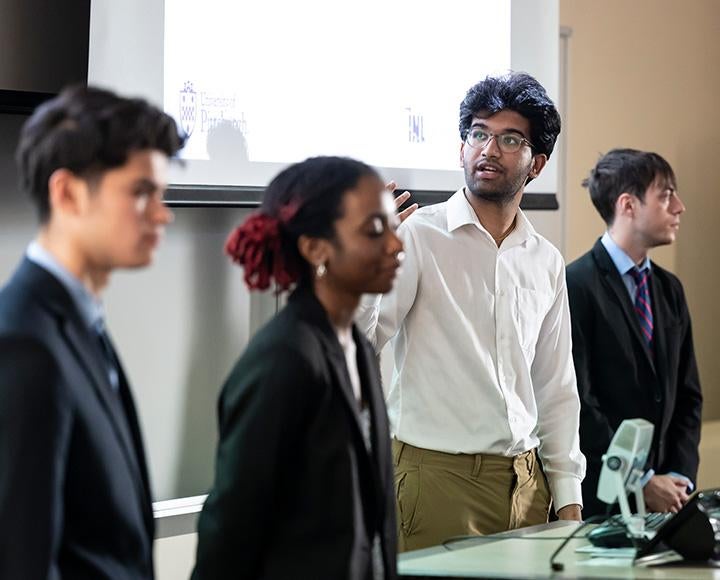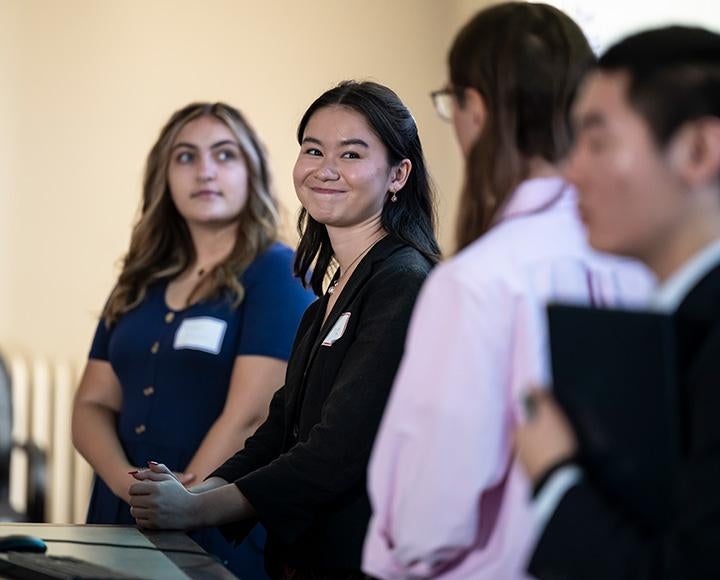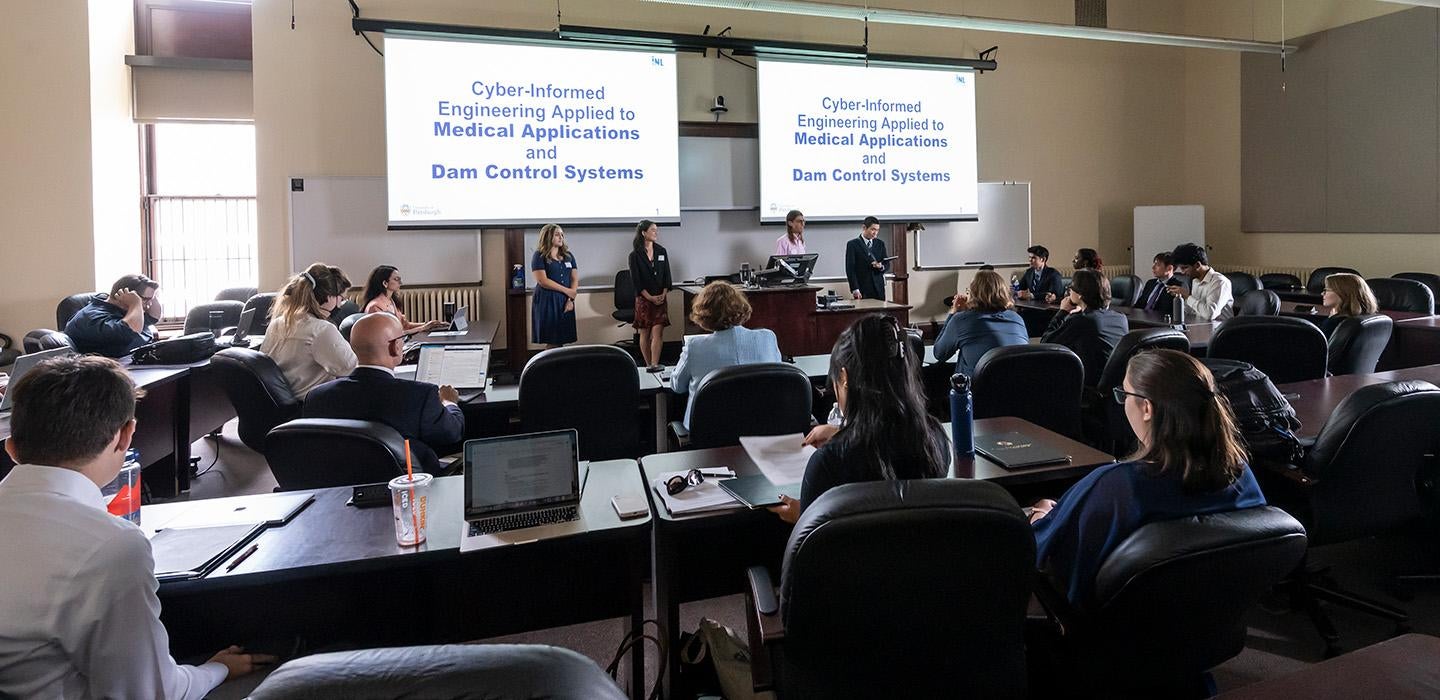
Subscribe to Pittwire Today
Get the most interesting and important stories from the University of Pittsburgh.A small water authority just outside Pittsburgh seemed like an unlikely victim of an international cyberattack.
On Nov. 25, however, a terrorist group successfully targeted the Municipal Authority of Aliquippa, raising concerns about further attacks in the United States and the vulnerability of the nation’s critical infrastructure. The risks associated with these attacks are forcing the worlds of operational technology and information technology to collide, but each field’s methodologies and solutions are vastly different, a disconnect that affects policy decisions and interventions.
This past summer, 16 interdisciplinary Pitt students worked to create solutions and inform action related to cyber-informed engineering (CIE) through the Summer Honors Undergraduate Research Experience in Electric Grid, or SHURE-Grid.
The 12-week program is a collaborative partnership between the David C. Frederick Honors College, the Swanson School of Engineering, Pitt’s Office of Research and the Idaho National Laboratory. With SHURE-Grid more firmly established, leading faculty took an innovative and interdisciplinary approach.
“The focus of the program is vastly different from last year,” said Mai Abdelhakim, associate professor of electrical and computer engineering at Pitt and one of leading faculty members for SHURE-Grid. “We’re focusing more on developing educational content on CIE that can be incorporated in courses at Pitt and potentially other universities and used for training professionals.”
Comprehending and conquering CIE
Cyber-informed engineering (CIE), developed by the U.S. Department of Energy in 2022, is a framework designed to safeguard critical infrastructure by integrating cybersecurity at each stage in the life cycle of engineering systems, from conception to operation. In its 2022 strategy document, the Department of Energy outlined the core concepts of CIE, which integrates cybersecurity considerations into the foundation of engineering and energy systems design.
With the program’s second year focused on a wide-reaching approach, the need to recruit students studying areas outside of engineering and computer science became clear.
Rob Cunningham, vice chancellor for research infrastructure for Pitt, believes some of the greatest innovations emerge from diverse research groups. He views SHURE-Grid as an opportunity for undergraduates to engage in this collaborative discourse early in their careers.
“Leveraging expertise from vastly different backgrounds creates a better result,” Cunningham said. “Typically, student research has to be focused, mostly sticking to one or two fields of study. Students enrolled in SHURE-Grid have the opportunity — and in fact are required — to collaborate on research with students from four different fields and with faculty with even greater breadth.”
Recruitment resulted in students from 10 different majors, including from Pitt’s Department of Electrical and Computer Engineering, Pitt’s School of Computing and Information, Pitt’s Film and Media Studies program and Departments of Neurology and Political Science.
Each group was given two case studies in each area to explore and were expected to produce an educational video, case study user guides with supporting media, and case-specific recommendations for organizational development in CIE industry areas. The groups worked with Kevin Smith, teaching professor and director of undergraduate studies in broadcast, to improve their presentations and produce their final videos and sizzle reels.
“Media stretches over every possible subject matter, every discipline,” Smith said. “As we all know, every single network has TV shows that involve technology, engineering — all those aspects. All this does is make my students even stronger, moving forward for what they want to do, because diversity in the discipline is a strength.”
[Meet Erin Clark, a junior who produced educational SHURE-Grid content.]
Selecting an interdisciplinary team of students meant working with faculty from a multitude of backgrounds, too. This stretch was as enriching for faculty as it was for the students.
“It was exciting for me to learn from my colleagues’ differing perspectives and viewpoints around multidisciplinary issues in cybersecurity,” said James Joshi, professor at the School of Computing and Information and director of the Laboratory of Education and Research on Security Assured Information Systems.
Some participants like Naomi Taylor, a junior majoring in film and media studies with a minor in Japanese, were only introduced to CIE in the first weeks of the program.
“During the first day, we had a two-hour intensive overview of what CIE was,” Taylor said. “I felt in over my head. I was primarily a STEM student in high school, but I pursued the arts in college. I didn’t think I would get the opportunity to revisit that type of work or research again, but one of the reasons I came to Pitt was to experience work that helped other people, leading me to join this program.”
Brandon Grainger, associate professor and Eaton Faculty Fellow of electrical and computer engineering, noted that students were given a heavy lift intellectually in 12 short weeks. Students had to learn research and development approaches, establish domain knowledge in electric power and cyber-informed engineering, learn the basics of a software tool of choice, work to understand policy and organizational behavior and practice their technical writing and presentation delivery skills.
“Regardless of major, SHURE-Grid students have to be able to comprehend this information and then convert it into something digestible,” Grainger said. “That’s not only an important skill for them now, but something they will carry with them in any field that they pursue for their career.”
Site visits and meetings with different organizations and individual experts helped the students fully grasp the impact of CIE and organizational structure throughout the summer.
“We looked specifically at vulnerabilities with circuit breakers, which are supposed to prevent damage to the circuit if something goes wrong. You can control that, and if the wrong people get ahold of it, something bad can happen. I didn’t comprehend that at first,” said Abby Magistro, a senior studying computer engineering. “When we visited Mitsubishi Electric, we got to actually see how circuit breakers were made, and that was something none of us were familiar with.”
With organizational culture being one of the key concepts of CIE, Ravi Madhavan, Alcoa Foundation International Faculty Fellow at Pitt’s Joseph M. Katz Graduate School of Business, led discussions and case studies on the subject.
“Technology solutions are embedded in organizations, which in turn consist of people,” Madhavan explained. “People have their own incentives and interests. With each case study and simulation, students had a better understanding of how people in organizations can affect technology solutions.”
The SHURE-Grid participants even met on their own time to further engage with the material. Brett Say, former director of honors research programs and now assistant director of surveys for the Office of the Provost, arranges stipends and housing for students in the program and has seen it evolve firsthand.
“This feels like the next step for SHURE-Grid and truly establishes how the future of the program will look,” Say said. “Last year, we were still working on the fundamentals of the program. This year, we’re providing a more holistic education for these students.”


Growing SHURE-Grid beyond Pittsburgh
The students’ work, in and out of the classroom, culminated in presentations that included a video detailing the work done throughout the semester. The groups also dissected problems and solutions for their case studies.
Ginger Wright, CIE program manager at Idaho National Laboratory, noted that the work done by Pitt students would inform new programs and educational courses for CIE.
“One of the largest challenges for CIE is building it into university curriculum, making sure the engineers of tomorrow come out ready to create defensible engineering designs,” Wright said. “What I saw during the final presentations was a glimmer of what’s to come. I saw elements of a curriculum that we can share with other universities — not just Pittsburgh.”
And compared to their first day in the program, Abdelhakim noted that students displayed noticeably more confidence during their final presentations.
“They all grew tremendously over the past 12 weeks,” Abdelhakim said. “Any time you work on an interdisciplinary project, it will push you out of your comfort zone, but all of the students pushed through it and only went forward.”
Photography by Aimee Obidzinski


